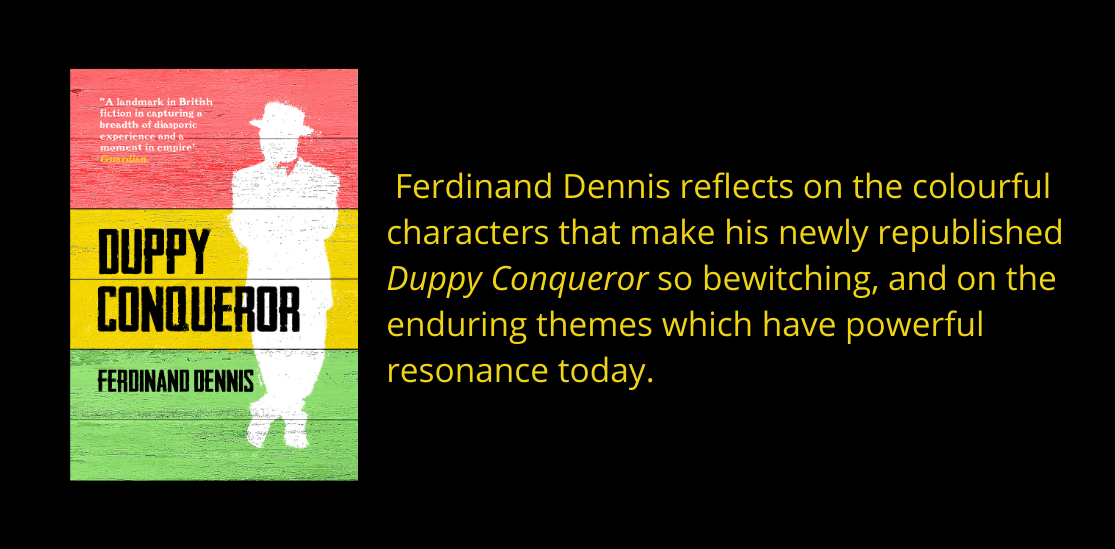I am delighted that Small Axes/HopeRoad has chosen to reprint my novel Duppy Conqueror, which tells the story of Marshall Sarjeant’s quest to end an ancient family curse. A twentieth century descendant of a union between an enslaved African woman and her white slave owner, Marshall’s journey begins during the Second World War, taking him from the town of Paradise in rural Jamaica to London, England, where, as a nightclub owner, he becomes involved in the growing pan-African movement. Later, years of living in an independent African country end with his expulsion for criticising the government. He eventually returns to Jamaica, where he faces the duppy.
The novel contains many fantastical episodes and teems with colourful characters, from the enigmatic Alegba, an African plantation overseer, to Pharaoh Sarjeant, one of Marshall’s relatives, who was once jailed for vandalising a Queen Victoria statue, to Baku Mathaku, an African scientist and political dissident. Among my favourite characters are Marshall’s school teacher, Teacher Lee, and his treacherous friend Scoop Fearon. But Marshall Sarjeant is my favourite character of all. Fearless curiosity, willingness to embark on the quest, risk-taking, political instincts, and frustrated artistic yearnings, search for love: despite failure, Marshall endures. These features and qualities, for me, make him a heroic figure.
Why should anybody buy a novel first published twenty-two years ago? Times have obviously changed, but Duppy Conqueror’s principal themes, the legacies of Slavery and Colonialism are still relevant. Indeed, the Black Lives Matter protests - triggered by the police’s killing of George Floyd - in the USA and several European countries have infused those themes with a new urgency and importance.
The protestors who pulled down the statues of slave traders Edward Colston and John Hawkins and Confederate general Robert E. Lee, and demanded the removal of Cecil Rhodes’s statue from an Oxford University College, and vandalised King Leopold’s statue in Brussels, were motivated by a similar sentiment to Pharaoh Sarjeant’s vandalising of a nineteenth century British monarch’s statue. A challenge to the notion that there is a single and incontestable version of history and a refusal to accept that people who committed heinous crimes against humanity or tried to perpetuate racially oppressive social orders should be presented as heroic figures. The forced removal of those statues from high streets, public squares, and parks, poses serious questions - to which there are no simple answers - about the past, the present, and the kind of future we want to create. So Duppy Conqueror, sometimes directly, sometimes obliquely, but always in its own novelistic way, chimes with an aspect of the present historical moment.
It’s also a moment, of course, of the worst pandemic for over a century. In my little corner of London life is hesitantly adjusting to an unstable new normal. Face masks and hand sanitisers are constant travel companions. I now have a patio garden: geraniums, a Jack Mani clematis, a yellow rose, a potato plant, two hostas and assorted ferns - all acquired in during the first 3 months of lockdown. With the temperature falling daily and the evenings drawing in, I have a new anxiety in my life: keeping my plants alive over the winter months. Watching them grow and flower helped me survive the long, lonely days of lockdown blues. So over the next few months gardening will serve as a break from working on The Black and White Museum; a collection of my short stories - most of which are original, some were published over the years in magazines and journals and broadcast on BBC Radio 4 - which Small Axes/HopeRoad will publish Autumn 2021.
Ferdinand Dennis
London, 2020
